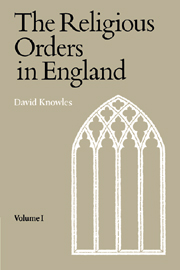Book contents
- Frontmatter
- Contents
- PREFACE
- LIST OF ABBREVIATIONS
- Part One The Old Orders, 1216—1340
- Part Two The Friars, 1216–1340
- Part Three The Monasteries and their World
- Chap. XXI The cathedral monasteries
- Chap. XXII The monastic boroughs
- Chap. XXIII The abbot
- Chap. XXIV The daily life of the monastery
- Chap. XXV Intellectual life—history, Art and music
- Chap. XXVI Monastic England, 1216–1340
- Appendices
- Bibliography
- Index
Chap. XXV - Intellectual life—history, Art and music
Published online by Cambridge University Press: 03 December 2009
- Frontmatter
- Contents
- PREFACE
- LIST OF ABBREVIATIONS
- Part One The Old Orders, 1216—1340
- Part Two The Friars, 1216–1340
- Part Three The Monasteries and their World
- Chap. XXI The cathedral monasteries
- Chap. XXII The monastic boroughs
- Chap. XXIII The abbot
- Chap. XXIV The daily life of the monastery
- Chap. XXV Intellectual life—history, Art and music
- Chap. XXVI Monastic England, 1216–1340
- Appendices
- Bibliography
- Index
Summary
The monasteries of England, which at the close of the eleventh century had been the sole focus of a highly developed literary culture, humane in spirit and seeking its models in the Roman past, did not long retain this position. The growth of a more complex society, the development of education in the cathedral and urban schools, the rise of a court circle of literary and legal clerks, and above all the magnetic power of the nascent universities, which drew to themselves all young talent and immersed it in the study of law or dialectic, entailed the transference of cultural leadership from the monasteries to the schools and the still more essential change from a literary culture to one that was primarily legal or dialectical. Already in the reign of John the race of great monastic chroniclers, biographers and letter-writers had died out, and though the monasteries with their rich libraries continued to nourish receptive minds with the classical literature and encyclopedic learning of the past, they were never again centres of purely intellectual life.
An exception, however, to the general decay of literary activity must be made in the case of St Albans. This great abbey, though neither the wealthiest nor the most populous in the country, could undoubtedly in the reign of Henry III vindicate its claim to be the premier monastery of England. Situated on the great North Road, near the capital, but not embarrassed by its business and unrest, the house had ever since the Conquest been fortunate in a succession of enlightened abbots and distinguished recruits, many of whom came from abroad, or had received their education on the continent.
- Type
- Chapter
- Information
- Religious Orders Vol 1 , pp. 291 - 307Publisher: Cambridge University PressPrint publication year: 1979



